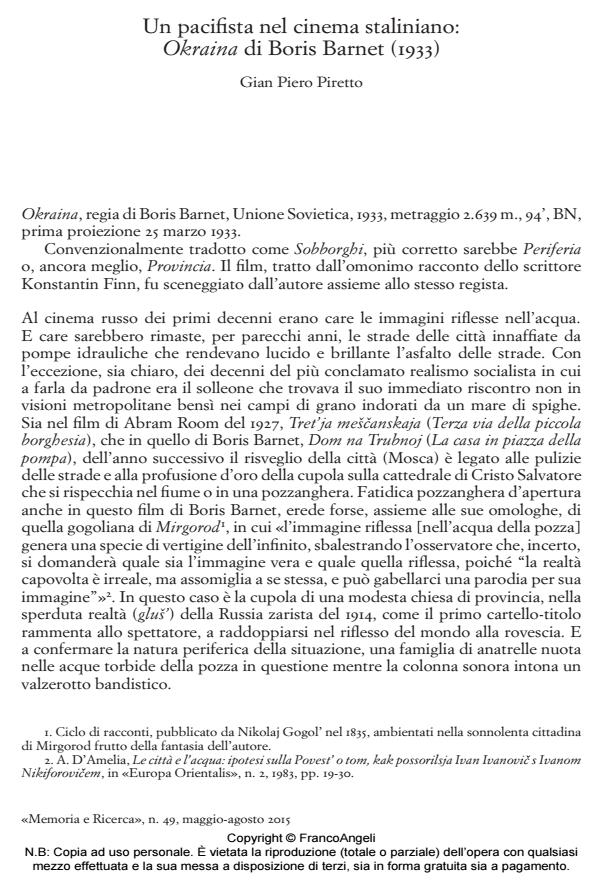Un pacifista nel cinema staliniano: Okraina di Boris Barnet (1933)
Titolo Rivista MEMORIA E RICERCA
Autori/Curatori Gian Pietro Piretto
Anno di pubblicazione 2015 Fascicolo 2015/49 Lingua Italiano
Numero pagine 11 P. 43-53 Dimensione file 143 KB
DOI 10.3280/MER2015-049004
Il DOI è il codice a barre della proprietà intellettuale: per saperne di più
clicca qui
Qui sotto puoi vedere in anteprima la prima pagina di questo articolo.
Se questo articolo ti interessa, lo puoi acquistare (e scaricare in formato pdf) seguendo le facili indicazioni per acquistare il download credit. Acquista Download Credits per scaricare questo Articolo in formato PDF

FrancoAngeli è membro della Publishers International Linking Association, Inc (PILA)associazione indipendente e non profit per facilitare (attraverso i servizi tecnologici implementati da CrossRef.org) l’accesso degli studiosi ai contenuti digitali nelle pubblicazioni professionali e scientifiche
In the Soviet Union, the switch from silent to sound cinema was not just a technological revolution, but also a chance, for the Communist Party leadership, to get rid of the ideologically suspicious avant-garde cinema of the twenties. The years of the transition to sound, from 1930 to 1934, are sort of a long dissolve, where the old "poetic" montage cinema coexists with the new "prose" of Socialist Realism. Boris Barnet’s Okraina is right in the middle of this complex phenomenon. On the one hand, the film tells a story typical of propaganda Soviet cinema: the origins (in World War One) and the outbreak of the October Revolution. But the style and the point of view chosen by Barnet are totally uncommon. Barnet tells a story of “little people", lost somewhere in the immense Russian countryside, far from Saint Petersburg and the Winter Palace (Okraina means "province"). Moreover, Okraina tells this story in a light, almost comic style. It is precisely this "Chekhov approach" that made Party critics very distrustful toward this film. The essay analyzes Okraina, and traces the history of its reception, from the coldness of the thirties, to the late rediscovery during the Khrushchev years, and then during the Perestroika.;
Keywords:Boris Barnet; internationalism; October Revolution; pacifism; post-Stalinism; Socialist Realism
Gian Pietro Piretto, Un pacifista nel cinema staliniano: Okraina di Boris Barnet (1933) in "MEMORIA E RICERCA " 49/2015, pp 43-53, DOI: 10.3280/MER2015-049004